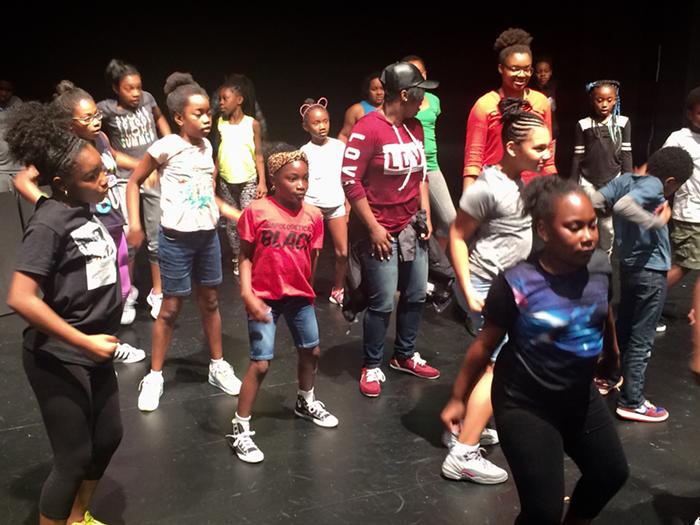
Rehearsal time! Langston Hughes Performance Arts Institute is one of the science and cultural programs that would benefit from Prop 1. Courtesy of Langston Hughes Performance Arts Institute
I am the oldest of three; we were raised by a single mother. I never had the opportunity to attend a paid dance school or professional acting classes, but I loved to dance and be around it. Where I grew up, there were little to no spaces where a young black man could go learn their craft—to say nothing of playing a lead in a summer show.
Somehow, at age 13, I got lucky enough to be in a play at a small community center in Illinois, sparking my interest the arts and putting me on a path to towards professional success—both in the arts and as an educator.
But for too many kids like myself, access to arts, science, and heritage experiences are too far out of reach. Either they can’t afford them or they are being delivered in a faraway place by people from a different community.
That’s why I’m voting ‘YES’ on King County Proposition 1.
Prop. 1 will open doors to arts, science and heritage programs for students and families across King County by lowering barriers to access. It fosters collaboration between organizations and schools by funding free field trips and in-class programs for every student—prioritizing schools with high populations of low-income students.
Funding for arts and culture programs across Washington has been being slashed in half for nearly a decade. As is all too often the case, these cuts have disproportionately affected low-income students and students of color.
When an arts classroom door closes or a school program gets shut down, however, we often don’t see the extent to which that affects students because it’s difficult to demonstrate a lack of an opportunity—especially for those with limited options in the first place.
When I arrived in Seattle at 20, I showed up to the Langston Hughes Performing Arts Institute not realizing it was the city’s entertainment hub for young black artists of every genre. Every room was filled with a performance of some kind—dance, spoken word, music. Up until that point, I had never learned from a community that looked like me.
I know intuitively the impact of the arts on kids’ lives. It improves education outcomes and quality of life, and Prop. 1 will ensure that schools with high populations of low-income students will finally receive priority for arts, science, and heritage educational experiences.
Take Cameron Sparks. A former student of mine, Cameron literally grew up at Langston Hughes. When he younger, he was into acting and making music. He could run around the different rooms and chase his curiosity with various artists. In high school, however, his interest turned to design. He went to college and became an engineer.
As a highly sought-after talent, Cameron was often told during interviews that his confidence set him apart. Interviewers often asked where how he got this “can’t-lose attitude?” Cameron—like so many former Langston Hughes students—point to the lessons of self-discipline and confidence he learned in the summer show.
Currently, we have 104 kids registered in the program, but over 200 audition. It’s the only program of its kind. The passage of Prop. 1 will help us do more, tripling the number of shows we run and expanding the number of kids we serve.
What we often don’t talk about when we talk about arts education is that it is transformational. What we know, however, is that the impact of that experience extends far beyond the last curtain call and sets them on a path for a better life.
At Langston Hughes, we do that very intentionally. Our classical theatre training is limited. Instead, we opt to teach life-long lessons that translate to any kind. We know every kid who comes through our program will get more than dance experience.
Because Cameron was exposed to the arts from an early age, he devoted himself to schoolwork and got into college. Because I caught a break at an early age, I am now a proud educator, community organizer, and arts activist.
Join me in making sure youth across our county get equitable access to arts, science, and heritage programs, no matter where they come from or how much money their family has.
Isiah Anderson Jr. is a staffer and director at Langston Hughes Performing Arts Institute.
RankTribe™ Black Business Directory News – Arts & Entertainment
